Kamoa-Kakula Copper Mine achieved Phase 1 commercial production on July 1, 2021; first phase projected to produce approximately 200,000 tonnes of copper per year
Kamoa-Kakula’s Phase 2 expansion, scheduled for Q3 2022, will double annual copper output to approximately 400,000 tonnes
Ivanhoe Mines pledges net-zero greenhouse gas emissions at the Kamoa-Kakula Copper Mine
Good progress being made on Ivanhoe’s Western Foreland exploration program, searching for DRC’s next tier-one copper discovery
Development of the world-scale Platreef palladium, rhodium, platinum, nickel, copper and gold project in South Africa making excellent progress
TORONTO, CANADA ‒ Ivanhoe Mines (TSX: IVN; OTCQX: IVPAF) today announced its financial results for the three and six months ended June 30, 2021. Ivanhoe Mines is a Canadian mining company advancing its three mining projects in Southern Africa: the Kamoa-Kakula copper mining complex in the Democratic Republic of Congo (DRC); the Platreef palladium-rhodium-platinum-nickel-copper-gold discovery in South Africa; and the extensive upgrading of the historic Kipushi zinc-copper-lead-germanium mine, also in the DRC. Ivanhoe also is exploring for new copper discoveries on its Western Foreland exploration licences in the DRC, near the Kamoa-Kakula Project. All figures are in U.S. dollars unless otherwise stated.
HIGHLIGHTS
- Kamoa-Kakula’s Phase 1 concentrator plant achieved commercial production on July 1, 2021. Kamoa-Kakula’s initial production guidance, on a 100%-project basis, is between 80,000 and 95,000 tonnes of copper in concentrate for 2021.
- Kamoa-Kakula’s Phase 2 construction is progressing slightly ahead of plan and remains on track for start-up in Q3 2022, which will see a doubling of mill throughput to 7.6 million tonnes per annum (Mtpa). Phases 1 and 2 combined are forecast to produce approximately 400,000 tonnes of copper per year.
- Study work to accelerate Phase 3 mine and concentrator expansion to at least 11.4 Mtpa is ongoing. Based on independent benchmarking, the project’s phased expansion scenario to 19 Mtpa would position Kamoa-Kakula as the world’s second-largest copper mining complex, with peak annual copper production of more than 800,000 tonnes.
- At the end of July 2021, Kamoa-Kakula’s surface ore stockpiles held approximately 3.54 million tonnes grading 4.77% copper, containing more than 168,000 tonnes of copper.
- Ivanhoe, together with its partner Zijin, is exploring the acceleration of the Kamoa-Kakula Phase 3 concentrator expansion, which includes optimization work to determine mining production capacity and costs at the various mining areas on the Kamoa-Kakula complex, including expanded facilities at the Kansoko Mine, Kamoa North (including the Bonanza Zone) and Kakula West. Kamoa Copper also is refining its longer-term downstream processing strategy, including the potential construction of a smelter or hydrometallurgical processing facility.
- In April 2021, Ivanhoe Mines Energy DRC entered into an agreement with the DRC’s state-owned power company Société Nationale d’Électricité (SNEL) to upgrade a major turbine at the Inga II hydropower facility. The upgraded turbine is expected to produce 162 megawatts (MW) of clean, renewable hydropower, providing the Kamoa-Kakula Copper Mine with sufficient, sustainable electricity for future expansions, including a copper smelter.
- In May 2021, Ivanhoe pledged to achieve net-zero operational greenhouse gas emissions (Scope 1 and 2) at the industry-leading Kamoa-Kakula Copper Mine. Since the mine already is powered by clean, renewable hydro-generated electricity, the focus of the company’s net-zero commitment will be on electrifying the project’s mining fleet with new, state-of-the-art equipment powered by electric batteries or hydrogen fuel cells. Emissions-free underground mining equipment, at the size and scale required for Kamoa-Kakula’s bulk-scale operations, is at an advanced stage of development by several of the world’s leading equipment manufacturers.
- During Q2, Ivanhoe continued its 2021 copper exploration program on its Western Foreland licences that cover a combined area of approximately 2,550 square kilometres in close proximity to Kamoa-Kakula. Drilling in the quarter was focused on the western and eastern extensions of the Makoko Discovery, as well as the northern and western extensions of the Kiala Discovery. Good progress was made on construction of critical infrastructure to access high-priority, newly-acquired westerly exploration permits, including construction of a 60-kilometre spine road across the Western Foreland and a new bridge across the Lubudi River.
- In February 2021, Ivanhoe announced that its South African subsidiary, Ivanplats, is arranging project-level financing of up to $420 million to advance development of the world-scale Platreef palladium, rhodium, platinum, nickel, copper and gold project in South Africa.
- Ivanplats has signed a non-binding term sheet with Orion Mine Finance, a leading international provider of production-linked stream financing to base and precious metals mining companies, for a $300-million gold, palladium and platinum streaming facility. Ivanplats also has appointed two prominent, international commercial banks – Societe Generale and Nedbank – as mandated lead arrangers for a senior project debt facility of up to $120 million.
- Ivanplats’ proposed financings follow the November 30, 2020 issuance of the outstanding findings of an independent Platreef Integrated Development Plan 2020 (Platreef IDP20), which consists of an updated feasibility study (Platreef 2020 FS) and a preliminary economic assessment (Platreef 2020 PEA). The initial capital cost for the phased development plan under the Platreef 2020 PEA, starting at a mining rate of 700,000 tonnes per annum (700 ktpa), is estimated at $390 million.
- Detailed engineering is progressing on Platreef’s 700-ktpa initial mine design, 770-ktpa concentrator and associated infrastructure for the phased development plan, which is scheduled to be incorporated into an updated feasibility study by year end or early 2022. The Shaft 1 changeover is progressing well in preparation for permanent hoisting in early 2022. Construction activities on the Shaft 2 headframe also are advancing. In July 2021, Ivanplats ordered emissions-free, battery electric drill rigs and underground loaders from leading Swedish manufacturer Epiroc, for use in the mine’s underground development.
- Construction activities on Platreef’s Shaft 2 headframe also are advancing.
- At the Kipushi Mine redevelopment project in the DRC, the Kipushi Project’s draft feasibility study, and development and financing plan are being reviewed by Ivanhoe Mines together with its joint-venture partner and state-owned mining company, Gécamines. The project is maintaining a reduced workforce to conduct maintenance activities and pumping operations.
- Ivanhoe has made excellent progress in upgrading Kipushi’s underground infrastructure to allow for mining to quickly begin at the ultra-high-grade Big Zinc orebody. Resumption of production at the mine now requires the construction of a surface processing plant and other related production facilities. Discussions are continuing with Gécamines to advance a new era of production at Kipushi and it is anticipated that these discussions will be concluded with the finalization of the feasibility study and the agreement on the development and financing plan.
- At the end of Q2 2021, Kamoa-Kakula had reached 1.49 million work hours free of a lost-time injury, Kipushi had reached 3.44 million work hours free of a lost-time injury, and Platreef had reached 57,000 work hours free of a lost-time injury.
Principal projects and review of activities
1. Kamoa-Kakula Project
39.6%-owned by Ivanhoe Mines
Democratic Republic of Congo
The Kamoa-Kakula Project, a joint venture between Ivanhoe Mines and Zijin Mining, has been independently ranked as the world’s fourth-largest copper deposit by international mining consultant Wood Mackenzie. The project is approximately 25 kilometres west of the town of Kolwezi and about 270 kilometres west of Lubumbashi. The Kamoa-Kakula Project began producing copper in May 2021 and achieved commercial production on July 1, 2021.
Ivanhoe sold a 49.5% share interest in Kamoa Holding Limited (Kamoa Holding) to Zijin Mining and a 1% share interest in Kamoa Holding to privately-owned Crystal River in December 2015. Since the conclusion of the Zijin transaction, each shareholder has been required to fund expenditures at the Kamoa-Kakula Project in an amount equivalent to its proportionate shareholding interest in Kamoa Holding.
A 5%, non-dilutable interest in the Kamoa-Kakula Project was transferred to the DRC government on September 11, 2012, for no consideration, pursuant to the 2002 DRC mining code. Following the signing of an agreement with the DRC government in November 2016, in which an additional 15% interest in the Kamoa-Kakula Project was transferred to the DRC government, Ivanhoe and Zijin Mining now each hold an indirect 39.6% interest in the Kamoa-Kakula Project, Crystal River holds an indirect 0.8% interest and the DRC government holds a direct 20% interest. Kamoa Holding holds an 80% interest in the project.
Health and safety at Kamoa-Kakula
At the end of June 2021, the Kamoa-Kakula Project reached 1,492,769 work hours free of a lost-time injury. A fatality occurred on May 31, 2021 when a contractor’s employee was hit in the leg by a loose falling rock while working at one of the mine’s underground faces, which caused the employee to fall backwards, striking his head. Despite immediate first-aid assistance by his colleagues, he passed away at the accident scene. Since the fatality, remedial safety interventions have been implemented. Two other lost-time injuries occurred in Q2 2021. The project continues to strive toward its workplace objective of zero harm to all employees and contractors.
Kamoa-Kakula has successfully focused on prevention, preparation, and mitigation in managing the risks associated with COVID-19. Large-scale testing, combined with focused preventative measures, ensured that positive cases were quickly identified, isolated, and treated, with cross contamination kept to a minimum. Maintaining this high standard of risk management remains a daily focus, to prevent future cases. During the first six months of 2021, the Kamoa-Kakula Project conducted 3,743 COVID-19 tests, with 163 patients testing positive for COVID-19.
Kamoa Copper has secured an initial supply of the AstraZeneca vaccine for employees, contractors and Democratic Republic of Congo residents who live in the mine’s host communities. Kamoa Copper continues to administer its initial supply of 1,500 doses. The second dose will be administered eight to 12 weeks after the first and a certificate of vaccination completion will be issued to those who have received two doses.
The Kamoa COVID-19 hospital continues to treat patients when required, as construction progresses well for the expansion and upgrade of the primary healthcare wing. Kamoa-Kakula’s highly-experienced doctors and nurses apply the latest medical treatments, supported by a world-leading emergency response and paramedic team.
Kamoa is one of 15 sites in the province where COVID-19 vaccination programs are being rolled-out to curb the spread of the virus. As the pandemic evolves, the medical team at the Kamoa hospital continues to review and update risk mitigation protocols, while ensuring that new medical advances are investigated and applied to protect the health and safety of employees and community members.
Copper concentrate production from the initial 3.8-Mtpa Kakula concentrator plant commenced in May 2021; commercial production achieved on July 1, 2021
Overall progress of Kamoa-Kakula’s first phase, 3.8-Mtpa mining and milling operation (covering mine infrastructure, concentrator plant and surface infrastructure) was very nearly complete at the end of Q2 2021. The only major construction activity that still was outstanding was the backfill plant which was completed in July 2021, with the first paste to be delivered to underground stopes in August 2021.
The backfill plant will be used to mix tailings from the processing plant with cement to produce paste backfill. The backfill will be pumped back into the mine and used to help support mined-out areas. Approximately one-half of the mine’s tailings will be sent back underground, significantly reducing the surface tailings storage. Construction of the tailings storage facility has been completed and first tailings deposited.
Overall construction of the project’s first phase, 3.8-Mtpa concentrator plant and associated facilities is complete, with C4 or hot commissioning advancing according to plan. First ore was introduced into the ball mills on May 20, 2021, and first saleable concentrate was filtered on May 25, 2021, marking the start of concentrate production. Lower-grade ore was fed into the plant during initial hot commissioning and the feed grade has since been increased.
The Kamoa-Kakula Project was deemed to have reached commercial production on July 1, 2021, after achieving a milling rate in excess of 80% of design capacity and recoveries close to 70% for a continuous, seven-day period. Revenue recognition, as well as depreciation of Kamoa-Kakula’s first phase, 3.8-Mtpa concentrator plant and milling operation, commenced from this date.
Approximately 500,000 tonnes of ore had been milled by early August 2021. Copper production has steadily increased since hot commissioning began at the end of May 2021. Copper production exceeded 500 tonnes per day on occasion during July, nearing the Phase 1 steady-state design capacity of approximately 550 tonnes per day, or 200,000 tonnes per year. During August, the focus of the commissioning team will shift from the front end crushing and milling circuit to balancing and optimizing the flotation and regrind milling areas. This is expected to further improve concentrate grade and recovery.
Copper recoveries increased from an average of approximately 70% in June 2021 to approximately 81% in July 2021, progressively increasing toward the Phase 1 steady-state design copper recoveries of approximately 86%.
As at June 30, 2021, contained copper in concentrate produced by the Kamoa-Kakula Project amounted to 9,858 tonnes. Ivanhoe’s guidance for contained copper in concentrate expected to be produced by the Kamoa-Kakula Project for 2021 assumes ramp-up from first production continues in line with published technical disclosures, and is as follows:
Kamoa-Kakula Project 2021 Guidance
Contained Copper in Concentrate 80,000 to 95,000 tonnes
All figures in the above table are on a 100%-project basis. Metal reported in concentrate is prior to refining losses or deductions associated with smelter terms. Cost guidance is expected to be provided once the Kamoa-Kakula Project’s Phase 1 plant has operated at steady-state production for a continuous period.
Loading high-grade copper concentrate at the Kamoa-Kakula concentrate storage warehouse for transport to the nearby Lualaba Copper Smelter for processing into blister copper ingots, containing approximately 99% copper.
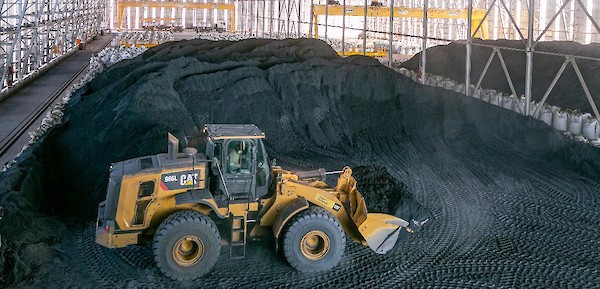
Construction of Kamoa-Kakula’s Phase 2 expansion is more than 35% complete; Phase 3 studies are progressing
Construction of the second 3.8-Mtpa concentrator plant is progressing well toward a Q3 2022 start-up with the current focus on the completion of civil works and early structural steel erection. Civil works are over 80% complete with a number of areas handed over to the steel, mechanical, piping and platework contractor.
Engineering and procurement activities are well advanced with both approximately 80% complete. Structural steel, platework and major equipment has started arriving on site and steel erection in the high-pressure grinding rolls and tailings thickening areas has commenced. The bulk of the structural steel and platework is scheduled to be on site in early Q3 2021. Piping fabrication is advancing well with some piping en route to site.
Ivanhoe and its partner Zijin are exploring the acceleration of the Kamoa-Kakula Phase 3 concentrator expansion, which may be fed from expanded mining operations at Kansoko, or new mining areas at Kamoa North (including the Bonanza Zone) and Kakula West.
Study work for the Phase 3 mine and concentrator expansion is underway, which includes optimization work to determine mining production capacity and costs at the various mining areas. This work also will inform the optimal sizing of the Phase 3 concentrator, which was outlined as a further expansion of 3.8 Mtpa in the Kamoa-Kakula Integrated Development Plan announced in September 2020. In addition, the studies will take into consideration the plans to upgrade Turbine 5 at the Inga II hydropower complex to provide 162 megawatts of renewable hydropower, as well as the construction of a direct-to-blister smelter.
Once the optimization work is completed, Kamoa Copper will advance into a more detailed phase of design and engineering work with its objective to accelerate the Phase 3 concentrator expansion.
Two views of Kamoa-Kakula’s Phase 1 concentrator plant in full operation and the adjacent, parallel Phase 2 concentrator plant under construction.
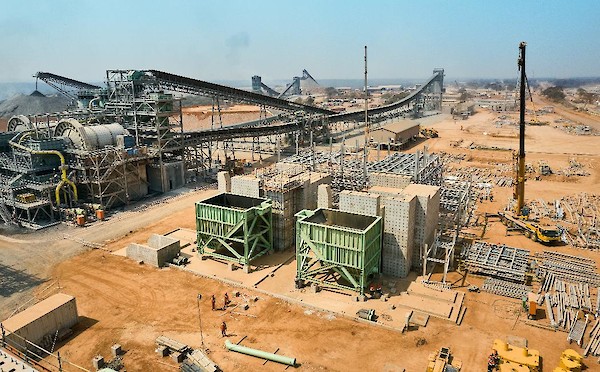
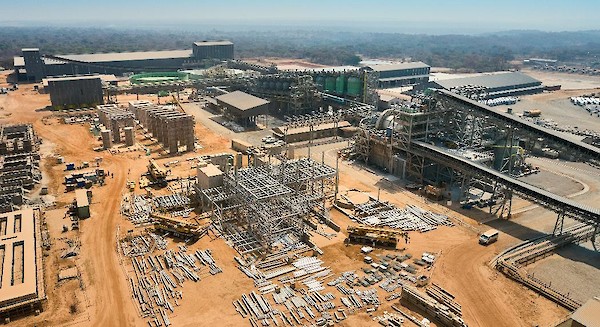
Construction of the Phase 2 tailings thickener is nearing completion.
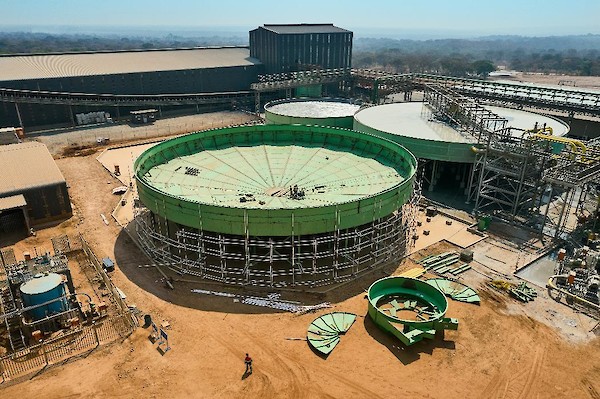
Ore stockpiles now hold approximately 3.54 million tonnes grading 4.77% copper, containing more than 168,000 tonnes of copper
At the end of March 2021, Kamoa-Kakula’s pre-production surface stockpiles contained approximately 2.56 million tonnes of high-grade and medium-grade ore at an estimated blended grade of 4.60% copper, containing more than 117,000 tonnes of copper.
The project’s combined medium-grade and high-grade ore mined was approximately 409,000 tonnes at an average grade of 5.71% copper in April 2021; approximately 406,000 tonnes at an average grade of 5.77% copper in May 2021; and approximately 338,000 tonnes at an average grade of 4.59% copper in June 2021.
This brings the project’s total pre-production high- and medium-grade ore surface stockpiles to approximately 3.40 million tonnes at an estimated grade of 4.78% copper as of the end of June 2021.
A total of 414,000 tonnes grading 5.16% copper was mined in July 2021 and comprised 367,000 tonnes grading 5.29% copper from the Kakula Mine, including 85,000 tonnes grading 7.70% copper from the mine’s high-grade centre, and 47,000 tonnes grading 4.13% copper from the Kansoko Mine.
First ore was fed into the concentrator plant on May 20, 2021, and the start of copper concentrate production occurred on May 25, 2021, several months ahead of schedule. As of June 30, 2021, 313,000 tonnes of ore grading 4.85% copper had been conveyed to the run-of-mine (ROM) stockpile.
New employee accommodations under construction at the Kakula Mine, with the Kakula North ore stockpiles and concentrator plant in the background.
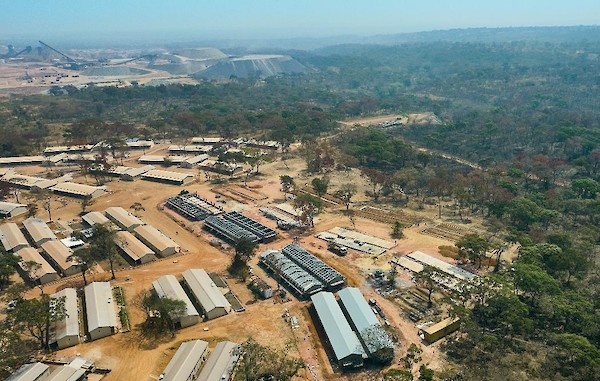
Kamoa-Kakula’s off-take agreements signed for Phase 1 blister copper and copper concentrate
On June 9, 2021, Kamoa Copper signed off-take agreements with CITIC Metal (HK) Limited (CITIC Metal) and Gold Mountains (H.K.) International Mining Company Limited, a subsidiary of Zijin, for 50% each of the copper products from Kamoa-Kakula’s Phase 1 production. The off-take agreements are evergreen for the production volumes from Phase 1, including copper concentrate and blister copper resulting from processing of copper concentrates at the nearby Lualaba Copper Smelter.
The off-take agreements contain standard, international commercial terms, including copper payables and treatment and refining charges based on the annual benchmark across the copper industry. The ultra-high-grade, clean concentrate produced by Kamoa-Kakula is expected to contain approximately 57% copper and very low levels of impurities.
CITIC Metal and Zijin are purchasing the copper concentrate at the Kakula Mine and the blister copper at the Lualaba Copper Smelter on a free-carrier basis, meaning the buyers will be responsible for arranging freight and shipment to the final destination, initially via the port of Durban, South Africa.
CITIC Metal and Zijin each provided an advance payment facility of $150 million ($300 million in total), which was drawn at the election of Kamoa Copper and received in June 2021. The facility carries an annual interest rate of 8% and will be offset against provisional payments due to Kamoa Copper from product deliveries. Payment terms include an option to receive a provisional payment on a 100%-basis within three business days of invoicing, at the end of each delivery month.
Agreement signed with Lualaba Copper Smelter to produce 99% blister copper in the DRC
On May 31, 2021, Kamoa Copper signed a 10-year agreement with the Lualaba Copper Smelter, located outside the town of Kolwezi, for the processing of a portion of Kamoa’s copper concentrate production. Kamoa Copper delivered its first bulk copper concentrates to the Lualaba Copper Smelter on June 1, 2021, and since then, deliveries to the smelter have been occurring on a daily basis. The Lualaba Copper Smelter is 60%-owned by China Nonferrous Metal Mining Group (CNMC) of Beijing, China. Yunnan Copper of Kunming, China, owns the remaining 40%.
The smelter, which began operations in early 2020, will treat up to 150,000 wet metric tonnes of copper concentrates from Kamoa-Kakula, in return for a treatment charge and market-based realization fee, and produce blister copper containing approximately 99% copper that will be returned to Kamoa Copper, and collected by CITIC Metal and Zijin from a dedicated storage area at the Lualaba Copper Smelter.
The Lualaba Copper Smelter is the first modern, large, pyro-metallurgical copper smelter built in the DRC, and is approximately 40 kilometres from Kamoa-Kakula via the recently-constructed, dedicated by-pass road.
The first truckloads of Kamoa-Kakula’s blister copper ingots, containing approximately 99% copper, were exported from the Lualaba Copper Smelter to international markets in July 2021.
Pouring Kamoa Copper blister ingots, containing approximately 99% copper, at the local Lualaba Copper Smelter.
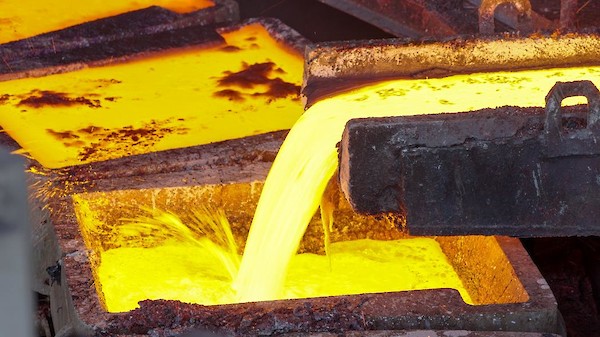
Kamoa Copper blister copper ingots produced at the Lualaba Copper Smelter being loaded for transport to international markets.
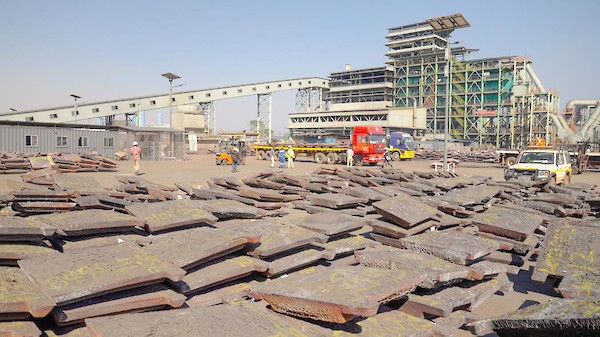
Kamoa-Kakula begins exporting copper concentrate internationally as production ramps up
Kamoa Copper SA began exporting its copper concentrate internationally in July 2021. The first truckloads of copper concentrate destined for smelters outside of the DRC departed from the mine site on July 17, 2021, marking a significant milestone in the ongoing ramp-up of Kamoa-Kakula’s Phase 1, 3.8-Mtpa concentrator plant.
By early August 2021, approximately 32,700 tonnes of copper concentrate had been loaded at the mine site for delivery to either the Lualaba Copper Smelter, or to international markets.
Kamoa Copper received all necessary authorizations from the DRC government to export copper concentrate and blister copper on June 8, 2021.
Transport trucks loaded with high-grade copper concentrate at Kamoa-Kakula awaiting customs approval, which usually takes five days, before beginning their journey to international smelters, via the port of Durban, South Africa.
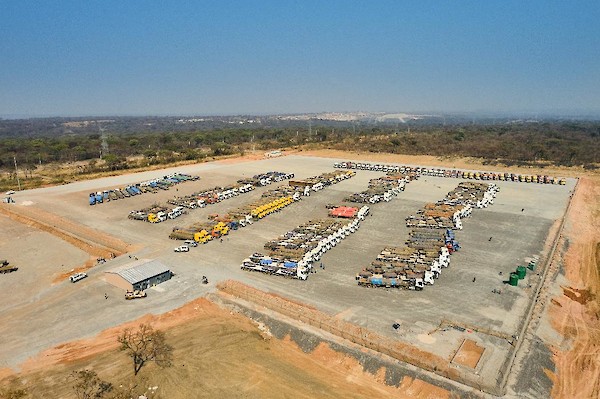
Draw-down of equipment financing facility successfully commenced
On December 1, 2020, Ivanhoe announced the Kamoa-Kakula Project had secured an equipment financing facility of up to EUR 176 million (approximately $211 million), together with a $9 million down-payment facility to purchase underground mobile mining equipment and services from leading Swedish manufacturers Sandvik AB and Epiroc AB, and Finnish manufacturer Normet Oy.
The facility has an availability period of three years and amortizes over five years from utilization and is tied to underground mining equipment at the Kamoa-Kakula Project. The Swedish Export Credit Agency (EKN) has provided both political and commercial cover to the lenders and receives a one-off premium per each tranche’s first utilization.
After the completion of all conditions precedent, the Kamoa-Kakula Project completed the draw-down of $9 million of the down-payment facility, and an equivalent of $56 million of the equipment financing, in December 2020. In 2021, further draw-downs of the equipment financing equivalent of $16.2 million were completed. Further draw-downs under the equipment finance facilities remain subject to conditions precedent customary for facilities of this nature. The company expects the conditions precedent to be met prior to each utilization.
The equipment finance is secured only by the equipment that is being financed. The down-payment facility is unsecured. No guarantee is required from any of the sponsors or parent companies with Kamoa Holding Limited issuing a non-binding Letter of Support, confirming its support for the project.
In addition, Gold Mountains (H.K.) International Mining Company has provided Kamoa Holding Limited with a limited recourse line of credit of $200 million secured by the project’s pre-production ore stockpiles to fund the Phase 2 concentrator expansion. Kamoa Holding has not yet drawn on this line of credit.
Kamoa-Kakula connected to the national power grid, providing clean, renewable 220-kV hydropower
The mine is receiving hydroelectric power via the permanent 35-kilometre, 220-kilovolt (kV) power line, supplying the project with reliable and clean hydro-generated electricity from the national grid.
The main mine 220-kilovolt Kamoa Consumer Substation (KCS) has been energized on grid power, as has the 33kV KCS substation. The main plant 33kV substation and all the plant medium-voltage and low-voltage substations also are energized.
Agreement reached to upgrade major turbine at the Inga II hydropower facility
On April 26, 2021, Ivanhoe announced that Ivanhoe Mines Energy DRC, a subsidiary of Kamoa Holding and sister company of Kamoa Copper SA, tasked with delivering reliable, clean, renewable hydropower to the Kamoa-Kakula Project, signed a memorandum of understanding in a public-private partnership with the DRC’s state-owned power company SNEL to upgrade a turbine 5, a major turbine at the existing Inga II hydropower facility on the Congo River. The upgraded turbine is expected to produce 162 MW of clean, renewable hydropower, providing the Kamoa-Kakula Copper Mine with sufficient, sustainable electricity for future expansions, including its own copper smelter.
A definitive agreement superseding the memorandum of understanding has been prepared and is expected to be signed imminently.
Aerial view of the Inga I (rear) and Inga II (front) hydropower plants on the Congo River. The penstock funneling water to turbine 5 at Inga II is circled in red.
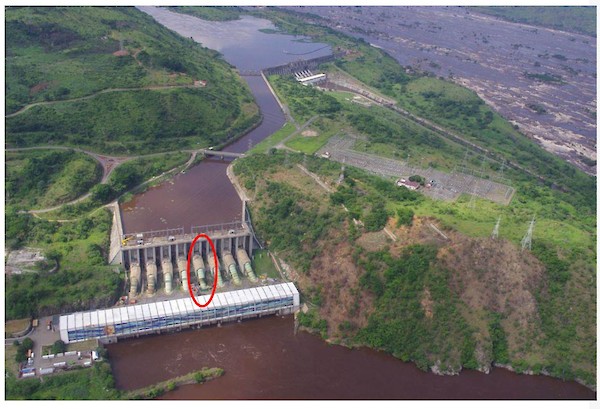
Ongoing upgrading work enables Mwadingusha hydropower station to supply clean, sustainable electricity
The upgrading work of six new turbines at the Mwadingusha hydropower plant, the first public-private partnership between Ivanhoe Mines Energy DRC and SNEL, is nearing completion and is expected to soon deliver approximately 78 MW of electricity to the national electrical grid, to provide power for Kamoa-Kakula’s initial two phases of production to 7.6 Mtpa. Five of the six new turbines at the Mwadingusha hydropower plant now have been synchronized to the national electrical grid, with each generating unit producing approximately 13 MW of power. The completion and commissioning of the hydropower plant’s remaining one generating unit is in progress. The synchronization of this last unit to the grid is expected in August 2021.
The work is being conducted by engineering firm Stucky Ltd. of Renens, Switzerland, under the direction of Ivanhoe Mines and Zijin Mining, in conjunction with the DRC’s state-owned power company, SNEL.
Aerial view of the 78-MW Mwadingusha hydropower plant, the reservoir and the community of Mwadingusha.
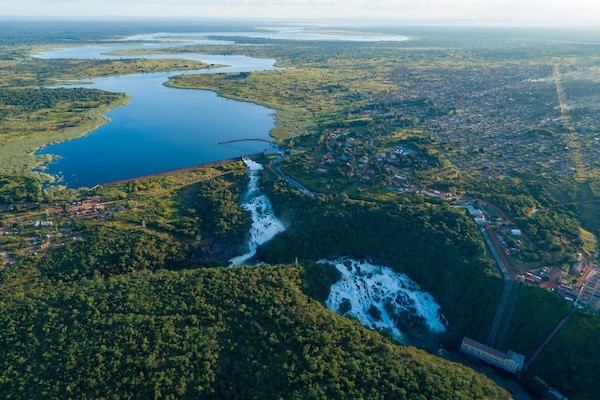
Kamoa-Kakula aiming to become the first net-zero carbon emitter among top-tier copper mines by electrifying its mining fleet with state-of-the-art equipment powered by electric batteries or hydrogen fuel cells
On May 5, 2021, Ivanhoe Mines announced its pledge to achieve net-zero operational greenhouse gas emissions (Scope 1 and 2) at the industry-leading Kamoa-Kakula Copper Mine.
In support of the Paris Agreement on climate change, and in the spirit of the commitments at the April 2021 Leaders Summit on Climate by the Chinese and American governments to sharply cut emissions, Ivanhoe Mines has committed to working with its joint-venture partners and leading underground mining equipment manufacturers to ensure that Kamoa-Kakula becomes the first net-zero operational carbon emitter among the world’s top-tier copper producers.
Since the Kamoa-Kakula mine and concentrator plant already are powered by clean, renewable hydro-generated electricity, the focus of the company’s net-zero commitment will be on electrifying the project’s mining fleet with new, state-of-the-art equipment powered by electric batteries or hydrogen fuel cells.
Kamoa-Kakula is working closely with its mining equipment suppliers to decrease the use of fossil fuels in its mining fleet, and evaluate the viability, safety and performance of new electric, hydrogen and hybrid technologies. The mine plans to introduce them into its mining fleet as soon as they become commercially available.
Enriching communities through sustainable development
The Sustainable Livelihoods Program was founded in 2010 to strengthen food security and farming capacity in the host communities near Kamoa-Kakula by establishing an agricultural training garden and support for farmers at the community level. Today, approximately 467 community farmers are benefiting from the Sustainable Livelihoods Program, producing high-quality food for their families and selling the surplus for additional income. The Sustainable Livelihoods Program, which commenced with maize and vegetable production, now includes fruit, aquaculture, poultry and honey.
The construction of 100 new fish ponds is progressing well with 60 ponds complete, of which 21 ponds are fully stocked and operational, and 20 ponds currently under construction. The project will significantly contribute toward local entrepreneurship and enhanced regional food security. The Musokantanda Agronomist Secondary School, constructed and equipped during 2020, now serves as a research facility and offers educational programs to 118 students, as well as training programs to local farmers. Plans also are underway for a collaboration between the agronomy school and the University of Kolwezi, which will provide further practical training for students.
Additional non-farming-related activities continued during Q2 2021 and include education programs, a community brick-making program, a sewing program, and the supply of fresh water to a number of local communities using solar-powered boreholes. The Tujenge brick-making program purchased an additional machine to enable the production of hollow bricks to meet the mine’s demand, successfully producing 9,000 bricks so far. To ensure that the sewing team is geared to commence operations and that production of Kamoa-Kakula personal protective equipment (PPE) and other garments meet quality standards, 28 members of the project have completed a six-month professional training program. The new Muvunda Primary School, catering to 206 students, has been opened. Construction and equipping of the Kaponda Primary School is underway. A total of 13 of a planned 29 boreholes were drilled in communities using local contractors, providing thousands of community members with easy access to clean water.
Construction of resettlement houses for the relocation program is continuing as planned. To date, 114 homes have been relocated, with 20 households remaining. The remaining families are scheduled for relocation upon completion of the construction of their new homes. Construction of the community church at Kaponda is 80% complete, with all concrete work finalized and the contractor currently installing all door frames and windows.
Excellent progress is being made on the new primary healthcare wing of the Kamoa hospital.
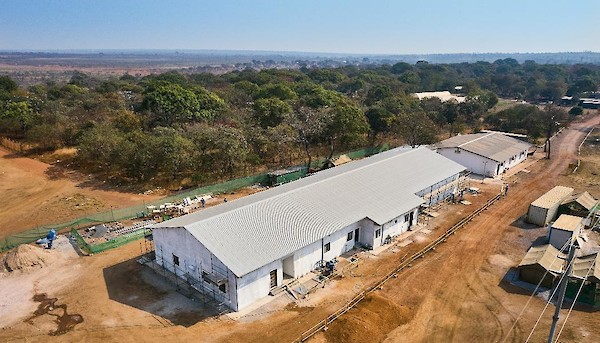
Five of the 100 new fish ponds being constructed in surrounding communities under the Kamoa-Kakula Sustainable Livelihoods Program.
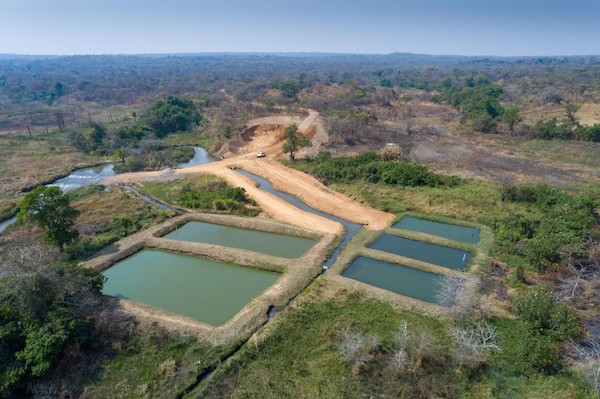
2. Platreef Project
64%-owned by Ivanhoe Mines
South Africa
The Platreef Project is owned by Ivanplats (Pty) Ltd (Ivanplats), which is 64%-owned by Ivanhoe Mines. A 26% interest is held by Ivanplats’ historically-disadvantaged, broad-based, black economic empowerment (B-BBEE) partners, which include 20 local host communities with approximately 150,000 people, project employees and local entrepreneurs. Ivanplats reached Level 4 contributor status in its most recent verification assessment on the B-BBEE scorecard. A Japanese consortium of ITOCHU Corporation, Japan Oil, Gas and Metals National Corporation, and Japan Gas Corporation, owns a 10% interest in Ivanplats, which it acquired in two tranches for a total investment of $290 million.
The Platreef Project hosts an underground deposit of thick, platinum-group metals, nickel, copper and gold mineralization on the Northern Limb of the Bushveld Igneous Complex in Limpopo Province – approximately 280 kilometres northeast of Johannesburg and eight kilometres from the town of Mokopane.
On the Northern Limb, platinum-group metals mineralization is primarily hosted within the Platreef, a mineralized sequence that is traced more than 30 kilometres along strike. Ivanhoe’s Platreef Project, within the Platreef’s southern sector, is comprised of two contiguous properties: Turfspruit and Macalacaskop. Turfspruit, the northernmost property, is contiguous with, and along strike from, Anglo Platinum’s Mogalakwena group of mining operations and properties.
Since 2007, Ivanhoe has focused its exploration and development activities on defining and advancing the down-dip extension of its original discovery at Platreef, now known as the Flatreef Deposit, which is amenable to highly-mechanized, underground mining methods. The Flatreef area lies entirely on the Turfspruit and Macalacaskop properties that form part of the company’s mining right.
Health and safety at Platreef
At the end of June 2021, the Platreef Project reached a total of 57,616 lost-time, injury-free hours worked, after the Project reported the first recordable injury for 2021 in June.
COVID-19 protocols are continuously reviewed and optimized to prevent and mitigate viral spread. During the first 6 months of 2021, the Platreef Project conducted 760 COVID-19 tests, with 38 patients testing positive for COVID-19. In support of the National Department of Health’s national vaccine rollout strategy, Ivanplats launched its own on-site COVID-19 vaccination campaign that has administered 279 vaccine doses to date. Approximately 73% of the Platreef Project’s employees and contractors working on site have at minimum received their first dose of vaccine.
Phased development plan, detailed engineering and feasibility study progressing well
Platreef’s detailed engineering and updated feasibility study for the phased development plan is progressing well toward completion by late 2021 or early 2022. Most of the design and engineering work has been completed and the focus now is on finalizing cost estimates.
Platreef Project with the Shaft 1 headframe on the right and a construction crane working on Shaft 2 in the centre.
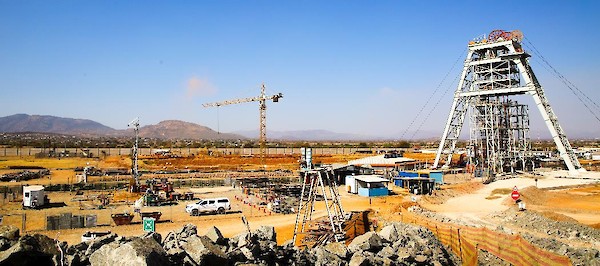
Project-level financing arrangements of up to $420 million to advance Platreef’s development
In February 2021, Ivanplats signed a non-binding term sheet with Orion Mine Finance, a leading international provider of production-linked stream financing to base and precious metals mining companies, for a $300 million gold, palladium and platinum streaming facility. The stream financing remains subject to completion of legal due diligence and structuring, as well as negotiation and execution of definitive documentation. The streaming facility is planned to be drawn down in two separate tranches, as needed, in parallel with the engineering studies to upgrade the Platreef 2020 PEA to a feasibility study and the changeover of Platreef’s Shaft 1 to a production shaft.
Ivanplats also appointed two prominent, international commercial banks – Societe Generale and Nedbank – as mandated lead arrangers for a senior project debt facility of up to $120 million. The senior project debt facility is scheduled to be utilized only after the streaming facility is fully drawn. Definitive terms and conditions of the debt facility are subject to the completion of the feasibility study for Platreef’s phased development plan, completion of due diligence and structuring, as well as negotiation and execution of definitive documentation. Terms and conditions of the debt facility will be made available when finalized.
Shaft 1 changeover to a production shaft progressing well
The construction of the 996-metre-level station at the bottom of Shaft 1 was completed in July 2020. Shaft 1 will initially be used to access the orebody, and is approximately 350 metres away from a high-grade area of Flatreef that is planned for bulk, mechanized mining. The three development stations that will provide initial, underground access to the high-grade orebody also have been completed on the 750-, 850-, and 950-metre levels.
Construction of the auxiliary winder foundations has been completed, and the auxiliary winder installed and commissioned. The headgear, both winders, equipping stage, conveyances and control systems comply with the highest current industry safety standards, with proven and tested safety and redundancy systems in place.
The changeover construction at Shaft 1 is progressing to plan and is on schedule for commencement of rock hoisting early in 2022. All equipment for the shaft changeover has been procured and is on site. The changeover work within the shaft is being done by Platreef’s experienced owners’ team.
The winder that was used to successfully sink Shaft 1 has been converted to function as the main equipping conveyance during the shaft changeover, and will serve as the permanent rock, personnel and material winder following the shaft-equipping phase. The shaft will be equipped with two 12.5-tonne skips (with hoisting capacity of 825,000 tonnes per year) and an interchangeable personnel and materials conveyance to accommodate the movement of personnel and materials during the initial phase of mining.
Rope guides will be used for the main rock, personnel and materials conveyances, while steel sets and guides will be used for the auxiliary winder conveyance. The stage and winder ropes used during the sinking phase have been removed, and the new equipping stage, permanent guide-ropes and permanent hoisting ropes have been installed. The auxiliary winder has been installed and commissioned to assist during the shaft and station equipping phase, and to function as a man winder during the main rock hoisting cycle. Shaft equipping reached the 450-metre-level station in July 2021.
Newly-designed rock chutes will connect the conveyors feeding the concentrator plant and the waste rock area; from there the waste rock will be crushed and used as cemented backfill underground, as well as for protection berms to contain storm water and reduce noise emissions.
Shaft equipping commenced in May 2021 and remains on track to be completed in early 2022. Following the completion of the changeover work in the shaft, underground stations, and establishment of the ore and waste passes, lateral underground mine development will commence toward high-grade ore zones.
Key underground development orders placed
The design and engineering for the waste conveyor, which will feed from Shaft 1, has been completed with the radial stacker conveyor order placed for delivery in February 2022. Additionally, Ivanplats placed an initial order with Epiroc for its primary mining fleet consisting of emissions-free, battery electric jumbo face drill rigs and load haul dumpers, due for delivery in early 2022.
An Epiroc Scooptram ST14 Battery loader, one of the emissions-free mining machines ordered by Ivanplats to begin underground development at the Platreef Mine.
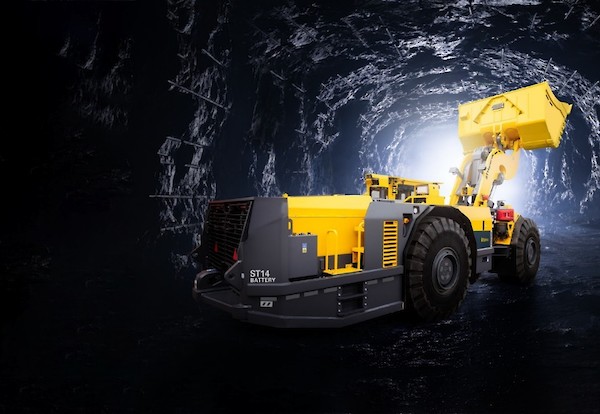
Shaft 2 headgear construction from hitch to collar well underway
Early-works surface construction for Shaft 2 began in 2017, including the excavation of a surface box-cut to a depth of approximately 29 metres below surface and construction of the concrete hitch for the 103-metre-tall concrete headgear (headframe), which will house the shaft’s permanent hoisting facilities and support the shaft collar.
The Shaft 2 headframe construction, from the hitch to the collar level, is progressing well with the first and second headgear lifts well advanced. A total of 10 civil lifts are to be constructed, including a ventilation plenum and personnel access tunnel, with a targeted completion of May 2022.
Platreef’s Shaft 2 construction, raising the headframe from the hitch to the collar (at surface).
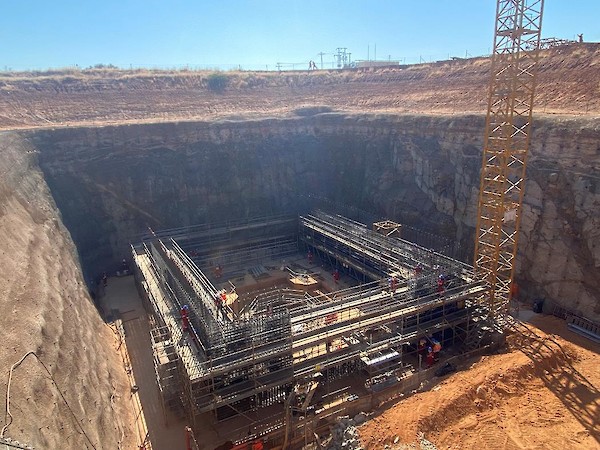
Underground mining to incorporate highly-productive, mechanized methods
Mining zones in the current Platreef mine plan occur at depths ranging from approximately 700 metres to 1,200 metres below surface. Initial access to the mine will be via the 996-metre-deep, 7.25-metre-diameter Shaft 1, that recently has been sunk to its final depth. Once expanded mine production is achieved, primary access to the mine will be by way of a 1,104-metre-deep, 10-metre-diameter production shaft (Shaft 2). During mine production, both shafts also will serve as ventilation intakes. Three additional ventilation exhaust raises (Ventilation Raise 1, 2 and 3) are planned to achieve steady-state production.
Mining will be performed using highly-productive mechanized methods, including long-hole stoping and drift-and-fill. Each method will utilize cemented backfill for maximum ore extraction. The production plans in both the PEA’s initial five-year drift-and-fill mining operation hoisting from Shaft 1, and the expansion when Shaft 2 is available, are focused on maximizing higher-grade areas, which is achieved through optimization based on stope locations, stope grades, mining method, and zone productivities. The orebody was targeted to recover approximately 125 million tonnes at the highest net smelter return.
Ore will be hauled from the stopes to a series of internal ore passes and fed to the bottom of the shafts, where it will be crushed and hoisted to surface.
Development of human resources and job skills
The Platreef Project’s second Social and Labour Plan (SLP) now has been approved. Through the implementation of this second SLP, Ivanplats plans to build on the first SLP and continue with its training and development suite, which includes 15 new mentors, internal skills training for 78 staff members, a legends program to prepare retiring employees with new/other skills, community adult education training for host community members, core technical skills training for at least 100 community members, portable skills training, and more. The Platreef Project continues to support several educational programs and the provision of free Wi-Fi in host communities.
Local economic development projects will contribute to community water-source development through the Mogalakwena Municipality boreholes program. Other projects, which will be undertaken in partnership with other parties, include the refurbishment and equipping of a clinic in Tshamahansi Village.
The enterprise and supplier development commitments comprise of expanding the existing kiosk and laundry facilities and adding expanded change house facilities to be managed by a community partner in the future. A five-year integrated business accelerator and funding project will assist community members to obtain help with development and supplier readiness.
3. Kipushi Project
68%-owned by Ivanhoe Mines
Democratic Republic of Congo
The Kipushi copper-zinc-germanium-silver-lead mine in the DRC is adjacent to the town of Kipushi and approximately 30 kilometres southwest of Lubumbashi. It is located on the Central African Copperbelt, approximately 250 kilometres southeast of the Kamoa-Kakula Project and less than one kilometre from the Zambian border. Ivanhoe acquired its 68% interest in the Kipushi Project in November 2011; the balance of 32% is held by the state-owned mining company, Gécamines.
Health and safety at Kipushi
At the end of June 2021, the Kipushi Project reached a total of 3,441,678 work hours free of lost-time injuries. It has been more than two and a half years since the last lost-time injury occurred at the project.
Since temporarily suspending mine development operations due to the COVID-19 pandemic, the project maintained a reduced workforce to safely and cost-effectively maintain infrastructure and pumping systems and to execute planned projects.
The Kipushi Project has built a new potable water station to provide a free daily supply of water to the municipality of Kipushi. The daily support in supply of free potable water to the Kipushi municipality community members includes power supply, disinfectant chemicals, routine maintenance, security and emergency repair of leaks to the primary reticulation to the benefit of an estimated 100,000 people, excluding those from rural areas. Approximately 1,000 cubic metres of potable water is pumped hourly and continuously to consumers on a daily basis.
50 boreholes of potable water are planned to be drilled around the Kipushi district over five years to reach areas not served by the current distribution reticulation. To date, 11 solar-powered potable water wells have been drilled and operate throughout the district.
The Kipushi Project continues to support educational initiatives through renovations and the supply of school desks to the Mungoti School, and the granting of bursaries and scholarships to students from Kipushi. Over the past four years, approximately 300 students have been supported through the bursary program. The sewing training centre project established by the Kipushi Project continued producing cloth face masks, donating approximately 2,000 masks a month to host communities. The Kipushi Project also is broadcasting daily COVID-19 awareness messages on a local community radio station, as well as through a motorized caravan.
The Sustainable Livelihoods Program, which commenced in 2020 with a poultry farming initiative established for the benefit of a consortium of local women, is progressing well with more than 500 chickens having been brought to market. This program is planned for expansion around the Kipushi district.
Kipushi’s definitive feasibility study in final stages of completion
The Kipushi Project’s pre-feasibility study (PFS), announced by Ivanhoe Mines on December 13, 2017, anticipated annual production of an average of 381,000 tonnes of zinc concentrate over an 11-year, initial mine life at a total cash cost of approximately $0.48 per pound (lb) of zinc.
The draft definitive feasibility study, together with the development and financing plan for Kipushi, are being reviewed by Ivanhoe Mines and its partner Gécamines. It is anticipated that these discussions will be concluded with the finalization of the feasibility study and the agreement on the development and financing plan by Q4 2021.
(L-R) Ethienne Mulambe, Jhon Nkunda and Mulanga stripping out the old winder from Kipushi’s Shaft 15.
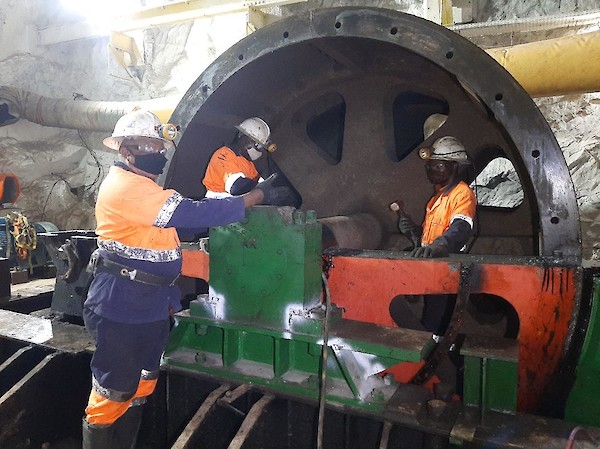
Project development and infrastructure
Although development and rehabilitation activities in the first half of 2021, as well as for 2020, were limited, significant progress has been made in recent years to modernize the Kipushi Mine’s underground infrastructure as part of preparations for the mine to resume commercial production, including upgrading a series of vertical mine shafts to various depths, with associated headframes, as well as underground mine excavations and infrastructure. A series of crosscuts and ventilation infrastructure still is in working condition and have been cleared of old materials and equipment to facilitate modern, mechanized mining. The underground infrastructure also includes a series of high-capacity pumps to manage the mine’s water levels, which now are easily maintained at the bottom of the mine.
Shaft 5 is eight metres in diameter and 1,240 metres deep and has been upgraded and re-commissioned. The main personnel and material winder has been upgraded and modernized to meet international industry standards and safety criteria. The Shaft 5 rock-hoisting winder also is fully operational with new rock skips, new head- and tail-ropes, and attachments installed. The two newly-manufactured rock conveyances (skips) and the supporting frames (bridles) have been installed in the shaft to facilitate the hoisting of rock from the main ore and waste storage silos feeding rock on the 1,200-metre level.
Since temporarily suspending mine development operations, priority engineering tasks still continue, including new winder installations as a second means of egress on the cascade side, and repairs, as well as replacement of main critical pump columns in Shaft 5 to ensure reliable and continued pumping of water from the mine.
Gael Shimatu drilling an anchor hole to install a safety barricade.
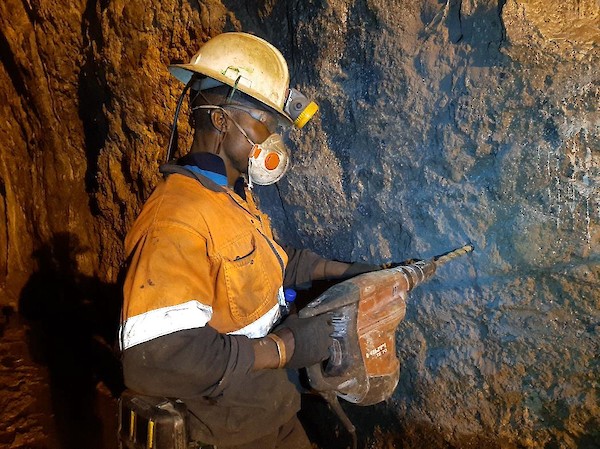
4. Western Foreland Exploration Project
100%-owned and 90%-owned by Ivanhoe Mines
Democratic Republic of Congo
Ivanhoe’s DRC exploration group is targeting Kamoa-Kakula-style copper mineralization through a regional exploration and drilling program on its Western Foreland exploration licences, located to the north, south and west of the Kamoa-Kakula Project. Ivanhoe’s Western Foreland Exploration Project consists of 17 licences that cover a combined area of approximately 2,550 square kilometres.
Exploration models that successfully led to the discoveries of Kakula, Kakula West, and the Kamoa North Bonanza Zone on the Kamoa-Kakula joint-venture mining licence are being applied to the extensive Western Foreland land package by the same team of exploration geologists responsible for previous discoveries.
Exploration activities at the Western Foreland area continued during Q2 2021, with drilling in the western and eastern extensions of the main Makoko area.
In Q2 2021, 32 diamond holes were completed at the Makoko area, on the west and the east of the main Makoko areas, following a fence of 1,000-metre spacing for a total of 7,310 metres. These results are pending assay. A 200-metre by 200-metre soil-sampling grid on this zone is planned for Q3 2021 for a follow-up on the previous soil geochemistry work.
Diamond drilling started at the Kiala discovery zone in late April. Nine holes have been drilled in the area to date for a total of 2,947 metres, investigating the extension to the north of the high-grade copper structure, as well as exploring the western extent of the zone. Assay results are pending.
The construction of a 16-kilometre road to provide critical access to the new exploration target areas on the newly-acquired western permits has been completed, as well as a bridge over the Lubudi River. Construction of a 60-kilometre access spine road across the western permits also has started, with 20 kilometres having been cleared to date, of which six kilometres have been covered with laterite. The plan is to complete the final bridge construction toward the end of the year once the spine road is complete.
Geophysical airborne surveys such as magnetics, gravity and electromagnetics are scheduled to start in early Q3 2021 in the Western Foreland and the Kamoa North areas. This new geophysical data will enhance the target delineation program for drill testing and soil sampling.
The recent Makoko West drilling is extremely significant for the exploration potential of the new exploration permits as it demonstrates that the target stratigraphy extends westward and that the copper mineralizing system on the western edge of the basin is laterally extensive. Future drilling in the Makoko West area will target specific structural locations that are conducive to developing higher copper grades.
Ivanhoe Mines’ Western Foreland exploration core shack at the Makoko Discovery.
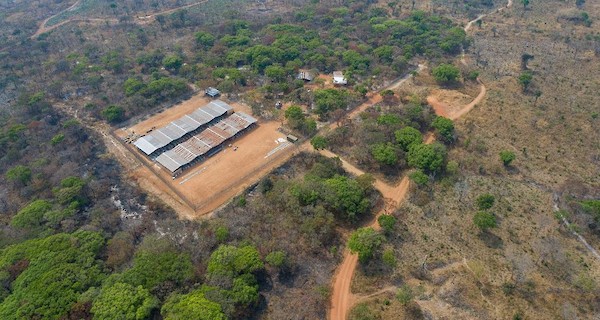
SELECTED QUARTERLY FINANCIAL INFORMATION
The following table summarizes selected financial information for the prior eight quarters. Ivanhoe had no operating revenue in any financial reporting period and did not declare or pay any dividend or distribution in any financial reporting period.
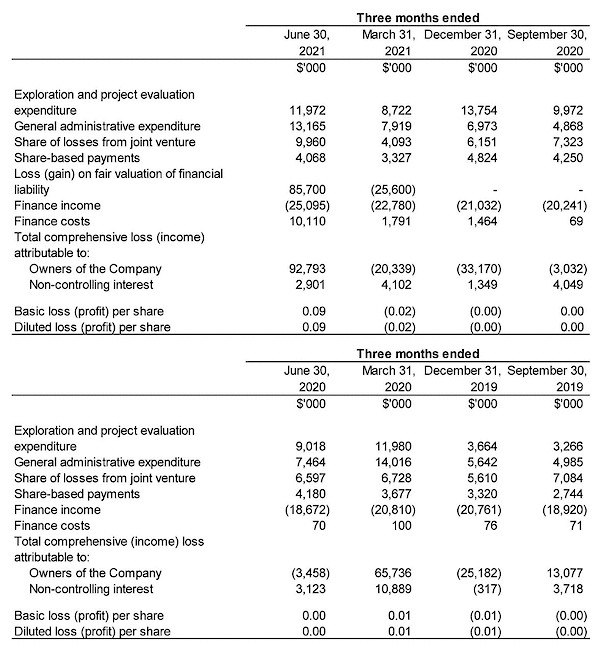
DISCUSSION OF RESULTS OF OPERATIONS
Accounting for the convertible notes closed in March 2021
The company closed a private placement offering of $575.0 million of 2.50% convertible senior notes maturing in 2026 on March 17, 2021. Upon conversion, the convertible notes may be settled, at the company’s election, in cash, common shares or a combination thereof. Due to this election right, the convertible notes have an embedded derivative liability that is measured at fair value with changes in value being recorded in profit or loss, as well as the host loan that is accounted for at amortized cost.
The convertible senior notes are senior unsecured obligations of the company which will accrue interest payable semi-annually in arrears at a rate of 2.50% per annum and will mature on April 15, 2026, unless earlier repurchased, redeemed or converted. The initial conversion rate of the notes is 134.5682 Class A common shares of the company per $1,000 principal amount of notes, or an initial conversion price of approximately $7.43 (equivalent to approximately C$9.31) per common share.
Holders of the notes may convert the notes, at their option, in integral multiples of $1,000 principal amount, or in excess thereof, at any time until the close of business on the business day immediately preceding October 15, 2025, but only under the following circumstances:
- during any calendar quarter commencing after the calendar quarter ending on June 30, 2021 (and only during such calendar quarter), if the last reported sale price of the company’s Class A common shares for at least 20 trading days (whether or not consecutive) during a period of 30 consecutive trading days ending on, and including, the last trading day of the immediately preceding calendar quarter is greater than or equal to 130% of the conversion price on each applicable trading day; or
- during the five consecutive business day period after any ten consecutive trading day period (the “measurement period”) in which the trading price per $1,000 principal amount of notes for each trading day of the measurement period was less than 98% of the product of the last reported sale price of the company’s Class A common shares and the conversion rate on each such trading day; or
- if the company calls any or all of the notes for redemption in certain circumstances or upon the occurrence of certain corporate events.
On or after October 15, 2025 until the close of business on the second scheduled trading day immediately preceding the maturity date, holders may convert all or any portion of their notes, in multiples of $1,000 principal amount, at the option of the holder regardless of the foregoing conditions.
The convertible notes will not be redeemable at the company’s option prior to April 22, 2024, except upon the occurrence of certain tax law changes. On or after April 22, 2024 and on or prior to the 41st scheduled trading day immediately preceding the maturity date, the notes will be redeemable at the company’s option if the last reported sale price of the company’s common shares has been at least 130% of the conversion price then in effect for at least 20 trading days (whether or not consecutive) during any 30 consecutive trading day period (including the last trading day of such period) ending on, and including, the trading day immediately preceding the date on which the company provides notice of redemption at a redemption price equal to 100% of the principal amount of the convertible notes to be redeemed, plus accrued and unpaid interest to, but excluding, the redemption date.
Due to the fact that upon conversion, the notes may be settled, at the company’s election, in cash, common shares or a combination thereof, the conversion feature is a derivative financial liability. The effect of this is that the host liability will be accounted for at amortized cost, with an embedded derivative liability being measured at fair value with changes in value being recorded in profit or loss.
The effective interest rate of the host liability was deemed to be 9.39% and the interest recognized on the convertible notes amounted to $9.8 million in Q2 2021 and $11.3 million for the six months ended June 30, 2021. The carrying value of the host liability was $425.3 million as at June 30, 2021.
The derivative liability had a fair value of $150.5 million on closure of the convertible notes offering, which decreased to $124.9 million as at March 31, 2021 and increased to $210.6 million as at June 30, 2021, resulting in a gain on fair valuation of financial liability of $25.6 million for Q1 2021 and a loss on fair valuation of financial liability of $85.7 million for Q2 2021. The change in the fair value of the embedded derivative liability is largely due to the changes in the closing share price of the company’s common shares at the different reporting dates.
The following key inputs and assumptions were used in determining the fair value of the embedded derivative liability:

Transaction costs on the convertible notes offering relating to the derivative liability amounted to $3.7 million and was expensed and included in the profit and loss for Q1 2021.
Review of the three months ended June 30, 2021 vs. June 30, 2020
The company recorded a total comprehensive loss of $95.7 million for Q2 2021 compared to income of $0.3 million for the same period in 2020.
As explained above, the company recognized a loss on fair valuation of the embedded derivative financial liability of $85.7 million for Q2 2021. Finance cost increased from $0.1 million for Q2 2020 to $10.1 million for the same period in 2021, $9.8 million of which related to the interest on the convertible notes at the effective interest rate.
Finance income for Q2 2021 amounted to $25.1 million, and was $6.4 million more than for the same period in 2020 ($18.7 million). Included in finance income is the interest earned on loans to the Kamoa Holding joint venture to fund operations that amounted to $23.0 million for Q2 2021, and $16.4 million for the same period in 2020, and increased as the accumulated loan balance increased.
Exploration and project evaluation expenditure amounted to $12.0 million in Q2 2021 and $9.0 million for the same period in 2020. Exploration and project evaluation expenditure related to exploration at Ivanhoe’s Western Foreland exploration licences and amounts spent at the Kipushi Project which was on reduced activities and incurred limited cost of a capital nature during these periods. The main classes of expenditure at the Kipushi Project in Q2 2021 and Q2 2020 are set out in the following table:
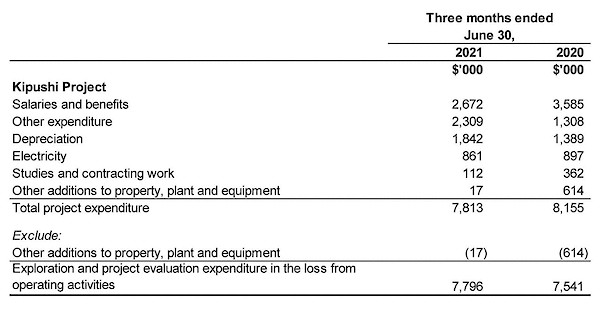
The company’s share of losses from the Kamoa Holding joint venture increased from $6.6 million in Q2 2020 to $10.0 million in Q2 2021. The following table summarizes the company’s share of losses of the joint venture for the three months ended June 30, 2021, and for the same period in 2020:
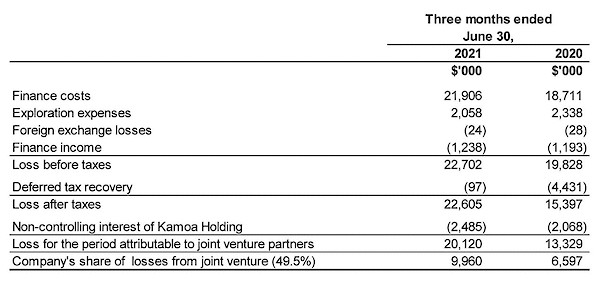
The finance costs in the Kamoa Holding joint venture relates to shareholder loans where each shareholder is required to fund Kamoa Holding in an amount equivalent to its proportionate shareholding interest. The company is advancing Crystal River’s portion on its behalf in return for an increase in the promissory note due to Ivanhoe.
Review of the six months ended June 30, 2021 vs. June 30, 2020
The company recorded a total comprehensive loss of $79.5 million for the six months ended June 30, 2021 compared to a loss of $76.3 million for the same period in 2020. As explained above, the company recognized a loss on fair valuation of the embedded derivative financial liability of $60.1 million for the six months ended June 30, 2021.
The comprehensive loss for the six months ended June 30, 2020, included an exchange loss on translation of foreign operations of $53.9 million, resulting from the weakening of the South African Rand by 24% from December 31, 2019, to June 30, 2020, compared to an exchange gain on translation of foreign operations recognized for the same period in 2021 of $8.7 million.
Finance income for the six months ended June 30, 2021, amounted to $47.9 million, and was $8.4 million more than for the same period in 2020 ($39.5 million). Included in finance income is the interest earned on loans to the Kamoa Holding joint venture to fund operations that amounted to $44.1 million for the six months ended June 30, 2021, and $32.7 million for the same period in 2020, interest increased as the accumulated loan balance increased. Interest received on cash and cash equivalents decreased due to US interest rate cuts by the Federal Reserve.
Exploration and project evaluation expenditure amounted to $20.7 million for the six months ended June 30, 2021, and $21.0 million for the same period in 2020. Exploration and project evaluation expenditure related to exploration at Ivanhoe’s Western Foreland exploration licences and amounts spent at the Kipushi Project which was on reduced activities and incurred limited cost of a capital nature in the periods. The main classes of expenditure at the Kipushi Project for the six months ended June 30, 2021 and for the same period in 2020 are set out in the following table:
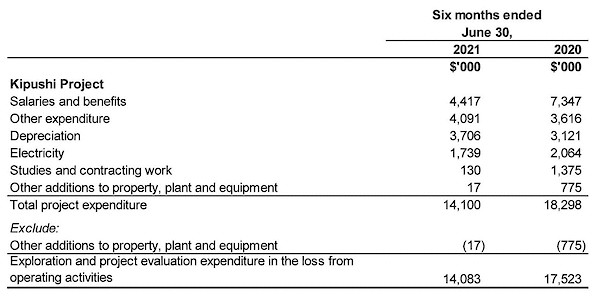
The company’s share of losses from the Kamoa Holding joint venture increased from $13.3 million for the six months ended June 30, 2020 to $14.1 million for the same period 2021. The following table summarizes the company’s share of the losses of Kamoa Holding for the six months ended June 30 2021, and for the same period in 2020:
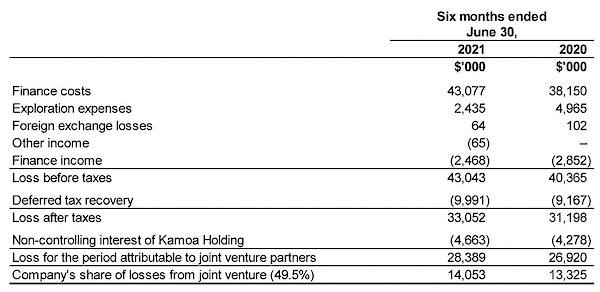
Financial position as at June 30, 2021 vs. December 31, 2020
The company’s total assets increased by $567.2 million, from $2,417.1 million as at December 31, 2020, to $2,984.3 million as at June 30, 2021. The main reason for the increase in total assets was the receipt of the net proceeds from the convertible senior notes that closed on March 17, 2021. The net proceeds from the sale of the convertible notes, after deducting the expenses of the offering that related to the host liability of $10.3 million, was $564.7 million.
Cash and cash equivalents increased by $381.6 million, from $262.8 million as at December 31, 2020, to $644.5 million as at June 30, 2021 due to the receipt of the convertible note proceeds. The company utilized $36.4 million of its cash resources in its operations and advanced loans of $127.6 million to the Kamoa Holding joint venture during the six months ended June 30, 2021.
The company’s total liabilities increased by $637.3 million to $717.9 million as at June 30, 2021, from $80.6 million as at December 31, 2020, with the increase mainly due to the private placement offering of $575.0 million of 2.50% convertible senior notes described above.
The net increase of property, plant and equipment amounted to $24.5 million, with additions of $19.9 million to project development and other property, plant and equipment. Of this total, $19.4 million pertained to development costs and other acquisitions of property, plant and equipment at the Platreef Project.
The main components of the additions to property, plant and equipment – including capitalized development costs – at the Platreef Project for the six months ended June 30, 2021, and for the same period in 2020, are set out in the following table:
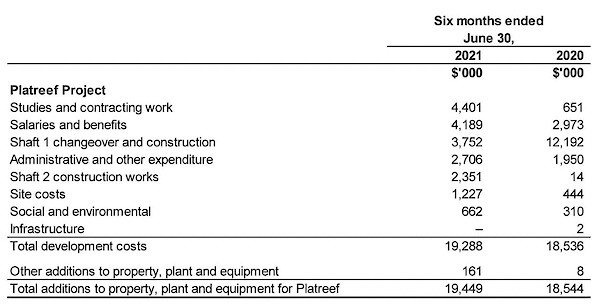
Costs incurred at the Platreef Project are deemed necessary to bring the project to commercial production and are therefore capitalized as property, plant and equipment.
The company’s investment in the Kamoa Holding joint venture increased by $157.7 million from $1,289.5 million as at December 31, 2020, to $1,447.2 million as at June 30, 2021, with each of the current shareholders funding the operations equivalent to their proportionate shareholding interest. The company’s portion of the Kamoa Holding joint venture cash calls amounted to $127.6 million during the six months ended June 30, 2021, while the company’s share of losses from the joint venture amounted to $14.1 million.
The company’s investment in the Kamoa Holding joint venture can be broken down as follows:

The Kamoa Holding joint venture principally uses loans advanced to it by its shareholders to advance the Kamoa-Kakula Project through investing in development costs and other property, plant and equipment, as well as continuing with exploration. This can be evidenced by the movement in the company’s share of net assets in the Kamoa Holding joint venture which can be broken down as follows:
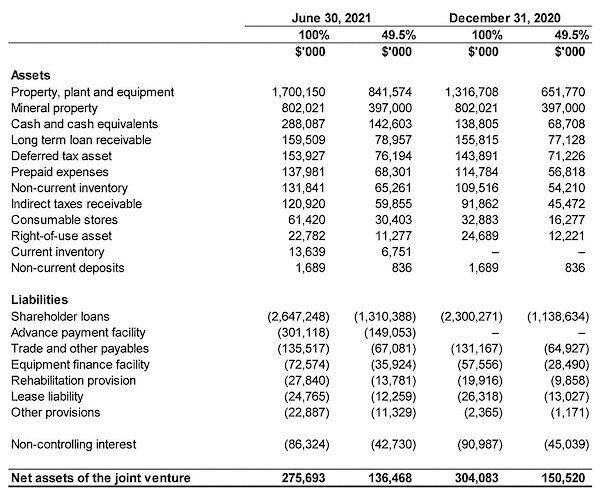
The Kamoa Holding joint venture completed the draw-down of EUR 45 million (approximately $56 million) of the equipment financing and $9 million of the down-payment facilities in late December 2020 and EUR 13.4 million (approximately $16.2 million) of the equipment financing during the six months ended June 30, 2021. The equipment finance is secured only by the equipment that is being financed and has an effective interest rate of 8.96%. The down-payment facility is unsecured and has an effective interest rate of 11.58%.
Furthermore, Kamoa Copper elected to draw the $300 million advance payment facility available under its offtake agreements in June 2021. The facility bears interest at a rate of 8% and will be offset against provisional payments due to Kamoa Copper from product deliveries.
The Kamoa Holding joint venture’s net increase in property, plant and equipment from December 31, 2020, to June 30, 2021, amounted to $383.4 million and can be further broken down as follows:
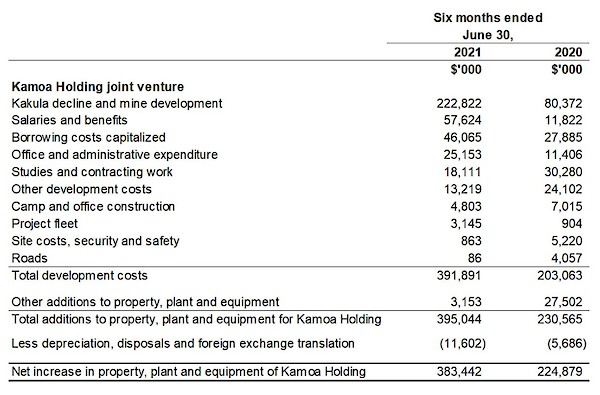
LIQUIDITY AND CAPITAL RESOURCES
The company had $644.5 million in cash and cash equivalents as at June 30, 2021. At this date, the company had consolidated working capital of approximately $689.9 million, compared to $544.8 million at December 31, 2020.
Since December 8, 2015, each shareholder in Kamoa Holding has been required to fund Kamoa Holding in an amount equivalent to its proportionate shareholding interest. The company is advancing Crystal River’s portion on its behalf in return for an increase in the promissory note due to Ivanhoe.
The Platreef Project’s current expenditure is being funded solely by Ivanhoe, through an interest-bearing loan to Ivanplats, as the Japanese consortium has elected not to contribute to current expenditures.
The company’s main objectives for the remainder of 2021 at the Platreef Project is the detailed engineering and updated feasibility study for the phased development plan, progression of the Shaft 1 changeover and the construction of the Shaft 2 headframe to the collar. At Kipushi, cost-saving measures will continue until the finalization of the feasibility study and the development and financing plan are agreed. With first production achieved at the Kamoa-Kakula Project, construction of the Phase 2 concentrator expansion and associated infrastructure continues.
The company has forecast to spend $56 million on further development at the Platreef Project; $17 million at the Kipushi Project; $15 million on Western Foreland exploration projects; and $16 million on corporate overheads for the remainder of 2021.
The Kamoa Holding joint venture had cash and cash equivalents on hand of $288.1 million as at June 30, 2021. Going forward, all Phase 1 operating costs and the majority of Phase 2 capital expenditures are expected to be funded from copper sales and facilities in place at Kamoa. Ivanhoe’s proportionate funding of Kamoa-Kakula’s Phase 2 construction capital costs for the remainder of 2021 is expected to be $85 million, with the assumption that the limited recourse line of credit from Zijin is not drawn.
On March 17, 2021, the company closed a private placement offering of $575 million of 2.50% convertible senior notes maturing in 2026. The convertible senior notes are senior unsecured obligations of the company which will accrue interest payable semi-annually in arrears at a rate of 2.50% per annum and will mature on April 15, 2026, unless earlier repurchased, redeemed or converted. The notes will be convertible at the option of holders, prior to the close of business on the business day immediately preceding October 15, 2025, only under certain circumstances and during certain periods, and thereafter, at any time until the close of business on the second scheduled trading day immediately preceding the maturity date. Upon conversion, the notes may be settled, at the company’s election, in cash, common shares or a combination thereof. The carrying value of the host liability was $425.3 million and the fair value of the embedded derivative liability was $210.6 million as at June 30, 2021.
The company has a mortgage bond outstanding on its offices in London, United Kingdom, of £3.2 million ($4.5 million). The bond is fully repayable on August 28, 2025, secured by the property and incurs interest at a rate of GBP 1 month LIBOR plus 1.9% payable monthly in arrears. Only interest will be payable until maturity.
In 2013, the company became party to a loan payable to ITC Platinum Development Limited, which had a carrying value of $32.9 million as at June 30, 2021, and a contractual amount due of $34.8 million. The loan is repayable once the Platreef Project has residual cashflow, which is defined in the loan agreement as gross revenue generated by the Platreef Project, less all operating costs attributable thereto, including all mining development and operating costs. The loan attracts interest of USD 3 month LIBOR plus 2% calculated monthly in arrears. Interest is not compounded. The difference of $1.9 million between the contractual amount due and the carrying value of the loan is the benefit derived from the low-interest loan.
The company has an implied commitment in terms of spending on work programs submitted to regulatory bodies to maintain the good standing of exploration and exploitation permits at its mineral properties. The following table sets forth the company’s long-term obligations:

Debt in the above table represents the mortgage bond owing to Citibank and loan payable to ITC Platinum Development Limited, as described above.
The company is required to fund its Kamoa Holding joint venture in an amount equivalent to its proportionate shareholding interest.
This news release should be read in conjunction with Ivanhoe Mines’ Q2 2021 Financial Statements and Management’s Discussion and Analysis report available at www.ivanhoemines.com and at www.sedar.com.
Qualified Persons and NI 43-101 Technical Reports
Disclosures of a scientific or technical nature regarding the revised capital expenditure and development scenarios at the Kamoa-Kakula Project in this news release have been reviewed and approved by Steve Amos, who is considered, by virtue of his education, experience and professional association, a Qualified Person under the terms of NI 43-101. Mr. Amos is not considered independent under NI 43-101 as he is the Head of the Kamoa Project. Mr. Amos has verified the technical data disclosed in this news release.
Other disclosures of a scientific or technical nature regarding the Kakula and Kansoko stockpiles in this news release have been reviewed and approved by George Gilchrist, who is considered, by virtue of his education, experience and professional association, a Qualified Person under the terms of NI 43-101. Mr. Gilchrist is not considered independent under NI 43-101 as he is the Vice President, Resources of Ivanhoe Mines. Mr. Gilchrist has verified the other technical data disclosed in this news release.
Other disclosures of a scientific or technical nature in this news release have been reviewed and approved by Stephen Torr, who is considered, by virtue of his education, experience and professional association, a Qualified Person under the terms of NI 43-101. Mr. Torr is not considered independent under NI 43-101 as he is the Vice President, Geosciences. Mr. Torr has verified the other technical data disclosed in this news release.
Ivanhoe has prepared a current, independent, NI 43-101-compliant technical report for each of the Platreef Project, the Kipushi Project and the Kamoa-Kakula Project, which are available under the company’s SEDAR profile at www.sedar.com:
- The Kamoa-Kakula Integrated Development Plan 2020 dated October 13, 2020, prepared by OreWin Pty Ltd., China Nerin Engineering Co., Ltd., DRA Global, Epoch Resources, Golder Associates Africa, KGHM Cuprum R&D Centre Ltd., Outotec Oyj, Paterson and Cooke, Stantec Consulting International LLC, SRK Consulting Inc., and Wood plc., covering the company’s Kamoa-Kakula Project;
- The Platreef Integrated Development Plan 2020 dated December 6, 2020, prepared by OreWin Pty Ltd., Wood plc (formerly Amec Foster Wheeler), SRK Consulting Inc., Stantec Consulting International LLC, DRA Global, and Golder Associates Africa, covering the company’s Platreef Project; and
- The Kipushi 2019 Mineral Resource Update dated March 28, 2019, prepared by OreWin Pty Ltd., MSA Group (Pty) Ltd., SRK Consulting (South Africa) (Pty) Ltd, and MDM (Technical) Africa Pty Ltd. (a division of Wood PLC), covering the company’s Kipushi Project.
These technical reports include relevant information regarding the effective dates and the assumptions, parameters and methods of the mineral resource estimates on the Platreef Project, the Kipushi Project and the Kamoa-Kakula Project cited in this news release, as well as information regarding data verification, exploration procedures and other matters relevant to the scientific and technical disclosure contained in this news release in respect of the Platreef Project, Kipushi Project and Kamoa-Kakula Project.
Information contacts
Investors
Bill Trenaman +1.604.331.9834
Media
Matthew Keevil +1.604.558.1034
Website www.ivanhoemines.com
Forward-looking statements
Certain statements in this news release constitute “forward-looking statements” or “forward-looking information” within the meaning of applicable securities laws. Such statements and information involve known and unknown risks, uncertainties and other factors that may cause the actual results, performance or achievements of the company, its projects, or industry results, to be materially different from any future results, performance or achievements expressed or implied by such forward-looking statements or information. Such statements can be identified by the use of words such as “may”, “would”, “could”, “will”, “intend”, “expect”, “believe”, “plan”, “anticipate”, “estimate”, “scheduled”, “forecast”, “predict” and other similar terminology, or state that certain actions, events or results “may”, “could”, “would”, “might” or “will” be taken, occur or be achieved. These statements reflect the company’s current expectations regarding future events, performance and results and speak only as of the date of the company’s MD&A for the three and six months ended June 30, 2021.
Such statements include without limitation, the timing and results of: (i) statements regarding that first paste from the backfill plant at Kakula will be delivered to underground stopes in August 2021; (ii) statements regarding approximately one-half of the Kakula mine’s tailings will be sent back underground, significantly reducing the surface tailings storage; (iii) statements regarding during August 2021 the focus of the commissioning team will shift from the front end crushing and milling circuit to balancing and optimizing the flotation and regrind milling areas and that this is expected to further improve concentrate grade and recovery; (iv) statements regarding construction of the second 3.8-Mtpa concentrator plant is progressing well toward a Q3 2022 start-up; (v) statements regarding Ivanhoe and its partner Zijin exploring the acceleration of the Kamoa-Kakula Phase 3 concentrator expansion; (vi) statements regarding the ultra-high-grade, clean concentrate produced by Kamoa-Kakula is expected to contain approximately 57% copper and very low levels of impurities; (vii) statements regarding the Lualaba Copper Smelter will treat up to 150,000 wet metric tonnes of copper concentrates from Kamoa-Kakula, in return for a treatment charge and market-based realization fee, and produce blister copper containing approximately 99% copper that will be returned to Kamoa Copper, and collected by CITIC Metal and Zijin from a dedicated storage area at the Lualaba Copper Smelter; (viii) statements regarding that as of June 30, 2021, the Kamoa-Kakula joint venture had an estimated $697 million of initial capital costs remaining for completion of Phase 1 and Phase 2; (ix) statements regarding the agreement reached to upgrade a major turbine at the Inga II hydropower facility including that the upgraded turbine is expected to produce 162 megawatts (MW) of clean, renewable hydropower, providing the Kamoa-Kakula Copper Mine with sufficient, sustainable electricity for future expansions, including its own copper smelter; (x) statements regarding refurbishment of six turbines at the Mwadingusha hydro-electric power plant and that the synchronization of the last unit to the grid is expected in August 2021; (xi) statements regarding Kamoa-Kakula aiming to become the first net-zero carbon emitter among the top-tier copper mines by electrifying its mining fleet with state-of-the-art equipment powered by electric batteries or hydrogen fuel cells; (xii) statements regarding the Platreef Project’s streaming facility, including that it is planned to be drawn down in four separate tranches; (xiii) statements regarding the Platreef Project’s Shaft 1 changeover and equipping including that it is progressing to plan and is on schedule for commencement of rock hoisting early in 2022; (xiv) statements that the construction of the Shaft 2 headframe from the hitch to the collar level is scheduled for completion in May 2022; (xv) statements regarding the planned mining methods at Platreef will use highly productive, mechanized methods, including long-hole stoping and drift-and-fill mining, and that each method will utilize cemented backfill for maximum ore extraction; (xvi) statements regarding the orebody at Platreef was targeted to recover approximately 125 million tonnes at the highest net smelter return; (xvii) statements that the draft feasibility study and development and financing plan for Kipushi are being reviewed by Ivanhoe Mines together with its partner Gécamines and that it is anticipated that these discussions will be concluded with the finalization of the feasibility study and the agreement on the development and financing plan by Q4 2021; (xviii) statements regarding future drilling in the Makoko West area including that it will target specific structural locations that are conducive to developing higher copper grades; (xix) statements regarding Ivanhoe’s guidance of contained copper in concentrate expected to be produced by the Kamoa-Kakula Project; (xx) statements regarding production guidance of between 80,00 and 95,000 tonnes of contained copper in concentrate for 2021 from the Kamoa-Kakula Project; (xxi) statements regarding Ivanhoe’s proportionate funding of Kamoa-Kakula’s Phase 2 construction capital costs for the remainder of 2021 is expected to be $85 million with the assumption that the limited recourse line of credit from Zijin is not drawn; and (xxii) statements regarding the main objectives for the remainder of 2021 and the remaining 2021 budget.
As well, all of the results of the feasibility study for the Kakula copper mine, the Kakula-Kansoko 2020 pre-feasibility study and the updated and expanded Kamoa-Kakula Project preliminary economic assessment, the feasibility study of the Platreef Project, the Platreef 2020 preliminary economic assessment and the pre-feasibility study of the Kipushi Project, constitute forward-looking statements or information, and include future estimates of internal rates of return, net present value, future production, estimates of cash cost, proposed mining plans and methods, mine life estimates, cash flow forecasts, metal recoveries, estimates of capital and operating costs and the size and timing of phased development of the projects. Furthermore, with respect to this specific forward-looking information concerning the development of the Kamoa-Kakula, Platreef and Kipushi projects, the company has based its assumptions and analysis on certain factors that are inherently uncertain. Uncertainties include: (i) the adequacy of infrastructure; (ii) geological characteristics; (iii) metallurgical characteristics of the mineralization; (iv) the ability to develop adequate processing capacity; (v) the price of copper, nickel, zinc, platinum, palladium, rhodium and gold; (vi) the availability of equipment and facilities necessary to complete development; (vii) the cost of consumables and mining and processing equipment; (viii) unforeseen technological and engineering problems; (ix) accidents or acts of sabotage or terrorism; (x) currency fluctuations; (xi) changes in regulations; (xii) the compliance by joint venture partners with terms of agreements; (xiii) the availability and productivity of skilled labour; (xiv) the regulation of the mining industry by various governmental agencies; (xv) the ability to raise sufficient capital to develop such projects; (xvi) changes in project scope or design, and (xvii) political factors.
This news release also contains references to estimates of Mineral Resources and Mineral Reserves. The estimation of Mineral Resources is inherently uncertain and involves subjective judgments about many relevant factors. Estimates of Mineral Reserves provide more certainty but still involve similar subjective judgments. Mineral Resources that are not Mineral Reserves do not have demonstrated economic viability. The accuracy of any such estimates is a function of the quantity and quality of available data, and of the assumptions made and judgments used in engineering and geological interpretation (including estimated future production from the company’s projects, the anticipated tonnages and grades that will be mined and the estimated level of recovery that will be realized), which may prove to be unreliable and depend, to a certain extent, upon the analysis of drilling results and statistical inferences that ultimately may prove to be inaccurate. Mineral Resource or Mineral Reserve estimates may have to be re-estimated based on: (i) fluctuations in copper, nickel, zinc, platinum group elements (PGE), gold or other mineral prices; (ii) results of drilling; (iii) metallurgical testing and other studies; (iv) proposed mining operations, including dilution; (v) the evaluation of mine plans subsequent to the date of any estimates and/or changes in mine plans; (vi) the possible failure to receive required permits, approvals and licences; and (vii) changes in law or regulation.
Forward-looking statements and information involve significant risks and uncertainties, should not be read as guarantees of future performance or results and will not necessarily be accurate indicators of whether or not such results will be achieved. A number of factors could cause actual results to differ materially from the results discussed in the forward-looking statements or information, including, but not limited to, the factors discussed below and under “Risk Factors”, and elsewhere in the company’s MD&A for the three and six months ended June 30, 2021, as well as unexpected changes in laws, rules or regulations, or their enforcement by applicable authorities; the failure of parties to contracts with the company to perform as agreed; social or labour unrest; changes in commodity prices; and the failure of exploration programs or studies to deliver anticipated results or results that would justify and support continued exploration, studies, development or operations.
Although the forward-looking statements contained in this news release are based upon what management of the company believes are reasonable assumptions, the company cannot assure investors that actual results will be consistent with these forward-looking statements. These forward-looking statements are made as of the date of this news release and are expressly qualified in their entirety by this cautionary statement. Subject to applicable securities laws, the company does not assume any obligation to update or revise the forward-looking statements contained herein to reflect events or circumstances occurring after the date of this news release.
The company’s actual results could differ materially from those anticipated in these forward-looking statements as a result of the factors set forth in the “Risk Factors” section and elsewhere in the company’s MD&A for the three and six months ended June 30, 2021.


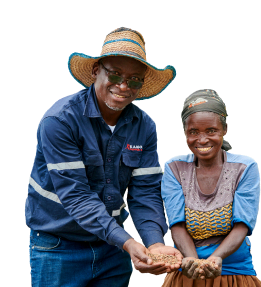
 English
English Français
Français 日本語
日本語 中文
中文